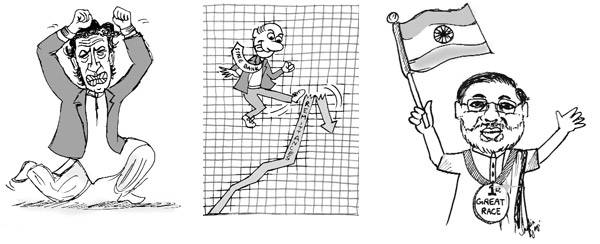
Free rein
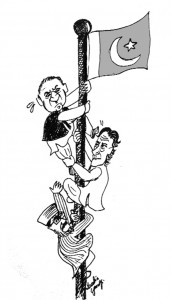
Sir,
Instead of celebrating our Independence Day together as one nation and one state, as is done by other sovereign self respecting countries, we are using the occasion for political agitation. In the recent past, the Independence Day has become a nonevent. Billions of rupees are wasted on other occasions, some of which have been declared national holidays, but Independence Day celebrations are postponed in the name of austerity and security concerns.
This country is fighting a war against terrorism, in which thousands of our soldiers and civilians have been brutally slaughtered, yet our political parties are too busy in what has become more a battle for turf than a legitimate political struggle within the confines of constitution. Whatever the arguments, the choice of 14th August for political agitation is totally unjustified.
The elected ruling party is also responsible for this predicament, as it has – through sheer incompetence and addiction to appointing cronies to head important state institutions, corporations and regulatory bodies – failed to deliver, or uphold the constitution in line with their oaths.
Mere statements of commitment to resolve the crippling energy crisis will not help. The problem will persist until the most qualified specialists with integrity are appointed at the helm, instead of political cronies.
What else did the government expect when it, in its wisdom (or lack of it), selected a pharmacist as an adviser on water and power? The culture of abuse of power, which has evolved through decades of poor governance, can no longer be endured, for Pakistan is today on verge of economic and administrative collapse.
What this country needs is zero tolerance and an effective system of punishment for all those involved in corruption, plunder, land grabbing, extortion and violation of laws, irrespective of political affiliations or their status in civil and uniformed bureaucracy.
Muneeb Ahmed,
Islamabad.
Shaming of the shrewd
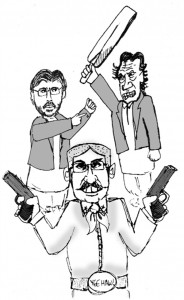
Sir,
This could be so much fun! Dr Tahirul Quadri’s Canadian democratic lessons in Lahore and an inept government’s vacillations are still front page material. Then, young Dr Arsalan, fresh from the yet unanswered fame of being in the mega-millionaire League of Extraordinary Gentlemen that Pakistan regularly throws up seemingly from nowhere, accuses Captain Imran (third time around that the issue has been aired, I think) of an extremely un-Islamic act of indiscreet passion. This is the pot calling the kettle black. At which the prime-minister aspirant, livid with his many other angers, has turned his guns towards PM Nawaz Sharif, whom he probably feels was the instigator, obviously apart from Chaudhry the senior. So now the kettle calls the frying pan blacker! On a weak wicket and sensing a bloodletting rejuvenation, Mr Zardari has turned the PPP guns on his former co-revenge-charter chum.
Two’s company, six a near riot. Our opaque zoo of leaders contains a plethora of known non-Saadiqs and un-Ameens with many more waiting to be discovered. Somewhat like those insistent on buying allegedly overpriced Serbian police junk. Not surprisingly, in the prize list of Pakistan’s Top 100 Tax Payers (who deservedly and rightly have probably already availed most of the benefits announced by NS and who now, with the additional exposure, will need to beef up their security from extortion and kidnapping etc, perhaps reducing the taxes they pay next year) is the little line, “There is no current parliamentarian among the top tax payers.” (DAWN, 16th July 2014). The many comments below the article are possibly more revealing and interesting than the article itself!
Given the jet setting, opulent, lifestyles and the unbreachable privileges and trappings of our politicians, elites and bureaucrats, one might expect that they and the parties they represent would have been vying for the #1 spots in this contest! The nation with little else of importance on its survival agenda yearns to be titillated by its salaciously insatiable press – which also has little better to offer. It would be lovely to have a real free for all and bring into the open all the pieces of our carefully and deliberately cultivated Glass Menagerie where, hopefully, some of our icons finally can be shattered.
But then, when the law remains conveniently bent to whitewash or afford these fine persons and their kith and kin shatterproof glass walled protection and nurture, how do we shatter the dynastic legacies and shame the shameless?
Dr Mervyn Hosein,
Karachi.
Homeless
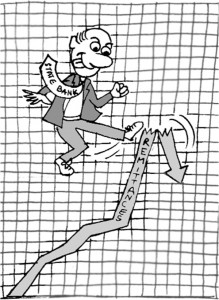
Sir,
Almost 80% of all foreign remittances are from Pakistani expatriates on work visas, who send their hard earned savings to feed their families living in this country. All expatriates working in the Gulf and the Middle East have a post box number as their postal address, which they use for opening bank accounts and receive mail. Residential addresses of these expatriates have no significance, because mail is never delivered to their houses or apartments, and most laborers are on the move, residing at temporary accommodations provided by their employers, contractors or sponsors. All these expatriates open bank accounts where their salaries are deposited, mentioning the names of their employers and their PO box numbers.
It is unfortunate that State Bank of Pakistan has made an individual’s residential address a requirement for sending remittances, and is not satisfied with a PO box number or the official address of an employer.
All such remittances are put on hold and the beneficiaries, mostly semi literate women, are required to submit further details. It is either sheer incompetence, unfamiliarity with ground realities, or else a deliberate attempt to discourage foreign remittances through official channels to facilitate those involved in the transfer of billions of dollars out of Pakistan through irregular channels.
Had it not been for remittances of those working on work visas in countries where residential addresses are just a PO box, Pakistan’s foreign reserves would be negligible. Instead of facilitating the large majority who remit their savings to Pakistan, our state institutions subject them to harassment and inconvenience.
Ali Malik,
Lahore.
Nawaz vs Modi
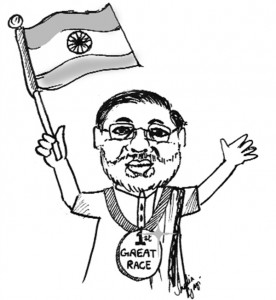
Sir,
Prime Minister Nawaz Sharif has been in power for almost 14 months, and other than mere announcements of large projects such as highways and transport, there have been no structural reforms to revamp a decadent bureaucracy, no improvement in tax collection, no police reforms and no outstanding investment in the neglected health and education sectors. It has taken this government more than a year to appoint a high commissioner to the UK, and there seems to be no intent to fulfill the electoral promises of providing qualified and competent specialists to head state corporations and financial and regulatory bodies. It is this lack of decision making capacity which has led to further accumulation of losses and inefficiency in white elephants like PSM, PIA, CAA, EOBI, Railways, FBR, NHA and the power distribution sector. The fact that the PML-N inherited a collapsed infrastructure from its predecessor required them to take quick, tough decisions, if economic recovery was a priority. Unless tax collection is increased, the national debt will continue to pile up, the deficit will increase and this country will not be able to invest in the development of human resources, which have shown a rapid deterioration in the last two decades and provided a perfect environment for breeding of terrorism.
In sharp contrast, Indian Prime Minister Narendra Modi has embarked on plans to change the decadent bureaucratic setup that existed to suit the dynastic policies of the Nehru family, under which institutionalized corruption had become a cancer. In just 30 days, Modi has ordered building a fast track road with 50 posts along the disputed China border, a $2 billion extension of the Karwar naval base in Karnataka, and radar stations in Andaman and Nicobar islands in the Bay of Bengal. The Modi government has approved stalled decision to raise the Narmada Dam to 455 feet for more water storage, and free X Ray, CT Scan and MRI for the poor in all government hospitals. In a move to keep a check on bureaucracy, the government has ordered them to repeal all laws which hinder good governance, transparency and delays in file movement, while withdrawing all powers from gazetted officers for attesting documents following complaints of misuse of power.
Modi has ordered his government to strictly ensure that no Indian holding a foreign nationality holds any public office. He has also issued instructions that in the future, only scientists and technical associates will be allowed to attend scientific and technical conferences in India and abroad, putting a total ban on any minister or bureaucrat to be part of such delegations. In a move to fulfill his election manifesto, Modi has ordered planting of 200 crore trees along the national highway to provide jobs to 3 million poor youth, and has put in place the most qualified people to head almost every state owned enterprise or corporation. He has also approved a revised strategy for kickstarting the ambitious National Optical Fiber Network to link 250,000 Panchayats and lower courts by March 2017.
Tariq Ali,
Lahore.
Power play

Sir,
What the world desperately needs are leaders with the morals, ethics and vision of Abraham Lincoln. The Cold War between super powers has been replaced by agenda for regime change and redrawing of boundaries by engineered rebellions and arming undisciplined rebels with sophisticated weaponry. Following the toppling of the elected pro-Russia government of Ukraine in February, and the 2013 EU trade agreement that effectively divided that country into pro-Russia and pro-EU blocs, tensions have heightened. The alleged brutal shooting down of MH 17 by pro-Russia rebels, resulting in the death of 298 innocent citizens, including children, should awaken the world to the inherent dangers involved in these proxy wars, when undisciplined trigger happy rebels, with access to sophisticated technology, go berserk, shooting anything in sight.
The MH 17, a Boeing 777, was flying on an approved airway over Ukraine territory, equipped with transponders that would have identified it as a civilian commercial aircraft, had there been a ground traffic radar controller coordinating with a disciplined national army, which itself possesses such a facility.
Today, rebels fighting proxy wars, armed by foreign countries, are fighting a brutal war in Iraq and Libya, and if they have access to such weaponry, the world’s aviation industry is not safe. As it is, Somalia under the control of pirates and warlords threatens the commercial cargo shipping industry. Afghanistan is another country facing prospects of a similar catastrophe in the making, if foreign intervention continues and proxy wars erupt after the 2014 NATO withdrawal.
We must not forget that on 3rd July 1988, Iran Air 655, an A300, was accidentally shot down by USS Vincennes, killing all 290 innocent civilians on board, including 66 children on their way from Tehran to Dubai. This was also an accidental brutality, where disciplined men in uniform, tired by prolonged tensions, had mistakenly fired a SM-2MR surface to air missile.
The planned savagery and brutality in Gaza, where more than a thousand Palestinians have been slaughtered, has yet to awaken world conscience, while an arrogant Israeli prime minister justifies it as self defense. The unfortunate reality is that a planned brutality is being perpetuated by a people who themselves were subjected to genocide and suffered humiliation and sufferings in concentration camps run by Nazis, and today they justify reducing Gaza to a large concentration camp with no access or corridor to the outside world.
Abid Nadeem,
Sukkur.
Why Imran will fail
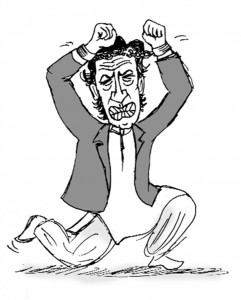
Sir,
Pakistan’s unpleasant political history is further marred by instances of failed attempts at bringing about a radical change under the flavorful context of revolution. More often than not, the call for revolution neither had any ideological depth nor political grounds. Of all such fruitless and often malicious endeavors, only four had any political or ideological weight to them. Three of these four attempts were made under the military dictatorships of, Ayub, Zia and Musharraf.
Zulfikar Ali Bhutto was the only civilian ruler to have generated a revolutionary wave with mass support from a relatively wider spectrum of the Pakistani society. Ayub era’s economic dynamism and land reforms, Bhutto’s success at creating broader political awareness with politics becoming more mainstream, Zia’s forging of a conservative force to counter a predominant leftist politics, and Musharraf’s progressive media policy are major legacies of these regimes. In essence though, they were an unable to bring the envisioned change.
One common link to otherwise distinct agendas has been the compulsion to accommodate the forces of status quo sooner or later. This was necessitated not only by the urge to protect the increasingly threatened political authority, but more importantly to preserve the unity of the federation. These forces are largely composed of feudal landlords and urban bosses often tied strongly in kinship bonds. This is a typical feature of Pakistani politics and gives these forces a massive influence over their subjects. If aggravated, they can shatter the foundations on which the federation exists.
Imran, with his promise of revolutionary change, is subject to a comparison with Zulfikar Ali Bhutto. Even if we assume that Imran is as charismatic a leader as Bhutto with an equally pluralistic support, a couple of questions still remain. With openness to debate, it can be implied that his rhetoric of creating an Islamic welfare state with a parallel agenda for westernized democracy does illustrate a certain degree of confusion. The other question with much simpler answer is whether he would ever join the forces of status quo like his predecessors in a call for change. The answer is he already has. In fact this argument alone takes all the air out of his revolutionary balloon.
His reliance on traditional politicians to create a political ground for himself is evidence enough of his impending failure. This gives credence to the argument that if Imran is ever to seize power, he will most likely be caught up in traditional Pakistani politics of patronage and kinship networks. This patronage would come at the expense and under the aegis of an ever weakening state, as has always been the case.
If Khan is ever to succeed, he will have to first and foremost break away from these shackles and come up with a clearer political agenda. He would then be left to face the harsh political realities of this country besides dealing with the complexities of holding together a federation.
Usman Zia,
Islamabad.

